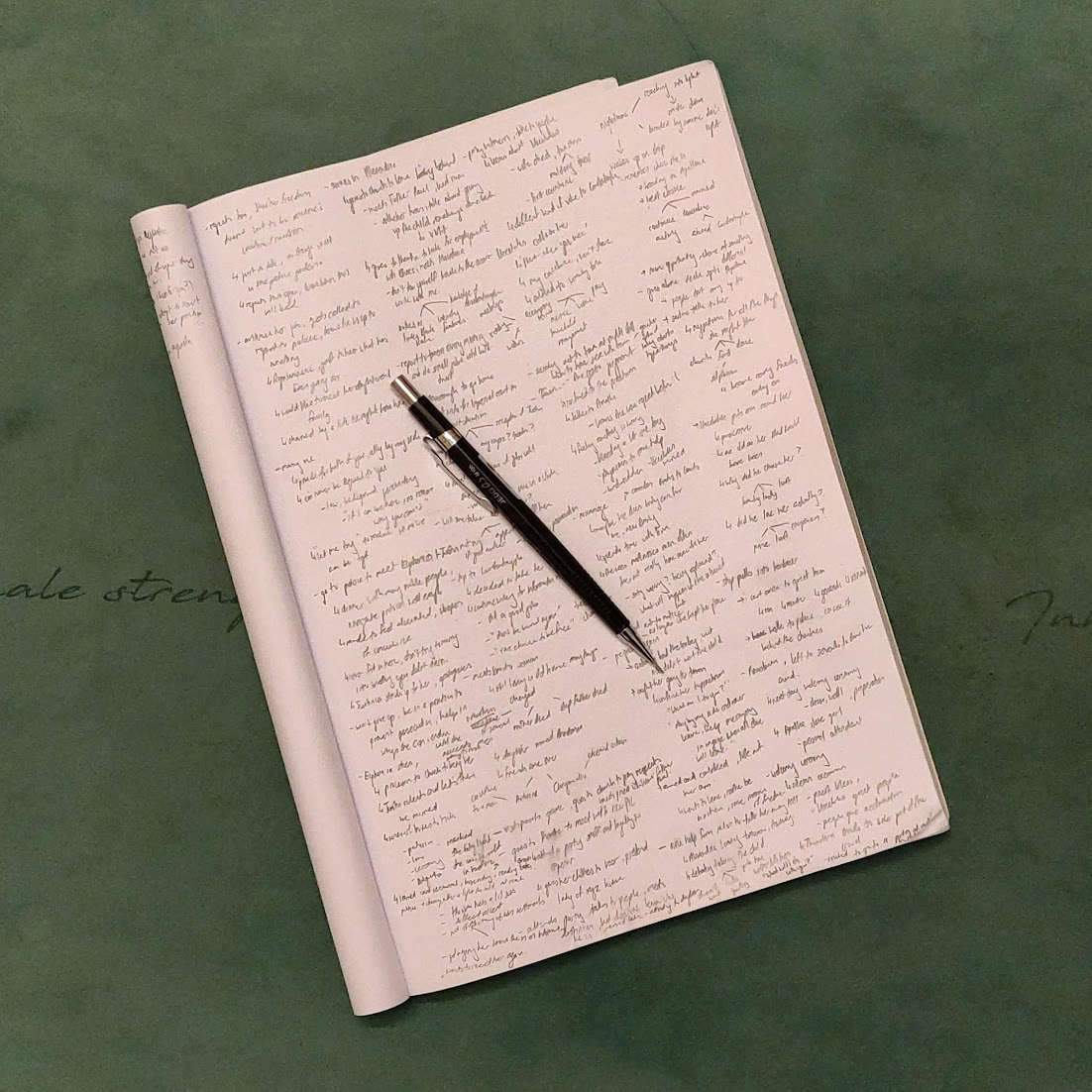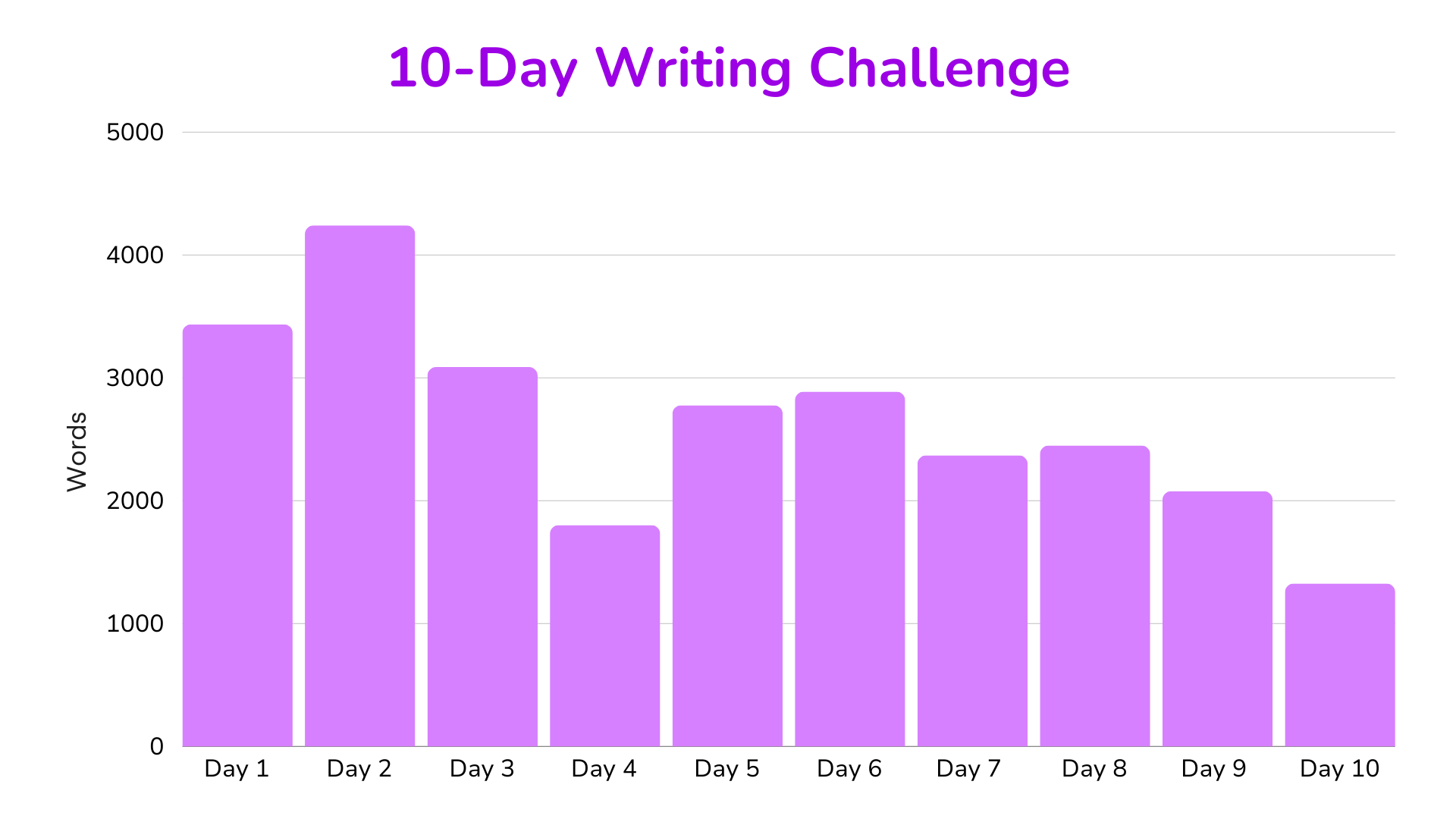Aug 29, 2024
I wrote 3,000 words a day for 35 days
Towards the end of 2020, I had written half of the first draft of my book (>30,000 words) and was on track to publish it before the summer started.
But in November 2019, after getting feedback on my portrayal of the 6th-century Byzantine Empress Theodora from a few experts on the era, I realised I had written Theodora as a passive character in her own life. It was as if she was being pushed through specific events in her life without exerting any will or thought. I made her out to be a puppet in her own story, and I realised I had to start over. I had to get her story right.
I had four months left to write the first draft, get feedback from beta readers, make edits, design the book cover, typeset, publish, and market the book. Also, I had to complete four courses during the last semester of my third year in university.
I needed to start prioritising setting myself up for post-graduation opportunities and completing my final year capstone project. Once the summer started, I couldn't afford to continue putting in as much time as I had been towards this book. If I didn't publish this book by the end of April, it would be at least a year before I picked it up again, and I knew I would have lost all the momentum driving me and the magic of this perfect moment.
Looking ahead, I needed the parts that required the most focus done by February or March before finals were due. I could leave final edits, typesetting, designing, and marketing for March and April, but I would need to get the first full draft ready before the semester kicked into high gear. This would give me time to get beta reader feedback while completing my coursework.
My updated timeline meant I had about a month to complete the first full draft. (maybe more if I rushed the other bits).
I knew I would be quarantined when I arrived back in Malaysia after my semester in Berlin, so I was ready to devote all 14 days to writing.
But it turns out you can't just will yourself to write.
I sat with my fingers on the keyboard, typing, deleting, staring at the screen, typing again, and then deleting everything I wrote. After an hour, I barely had a paragraph on the page.
I kept getting stuck because:
- I started the last 10 sentences with the same word and felt compelled to rewrite it.
- I had to sift through hundreds of pages of notes I made from 43 academic papers and books I read about the period to find a particular detail.
- I couldn't describe what the food tasted like, what she wore, or what the weather was like, and I needed to do a few hours of additional research to find out.
- I couldn't figure out how pieces of the story connected.
- I rewrote the same sentence over and over again because I didn't think it was good enough
I decided to stop fussing over my writing and focus on the story's details. I needed a full story outline, much like the worksheets I received in primary school to teach students to write essays. The students’ task was to create an essay from bullet points that told them what to include in each paragraph.
So, I took pencil to paper and wrote down exactly how the story would flow from start to finish. I included every scene transition, every thought, feeling, sentence fragment, dates of events, the Latin names of certain objects so that when I started to write, I could keep writing without second-guessing myself.

After 3 days, I had 8 pages of outline and felt ready to launch into writing. The next thing to tackle was motivation, so I set a challenge for myself.
The Challenge
🎯 Write 3,000 words every day for 10 days.
That's six full pages of words or a university essay assignment every day. The average novel has 80,000 words, which meant if I kept at this pace, I'd be able to finish within a month.

I got off to a good start — even surpassing my goal! I knew exactly what to write, and the words poured out of me, but that gush slowed to a trickle after 3 days.
I'd sit in front of my computer for hours, forcing myself to write, trying to string sentences together, but my motivation was starting to wane. I'd tell myself I couldn't go to bed or the bathroom or eat or drink or get up if I didn't write another hundred words. I spent hours staring out the window of the room I had been confined to for the past week, wondering why the hell I couldn't just write.
I discovered a writing hack a few days in when my fingers refused to move on the keyboard — I spoke into Otter and then edited the transcription. It was a nice change of pace to edit instead of write and an effective way to avoid the urge to edit as I wrote.
Still, speaking for half an hour only yielded ~500 quality words, and towards the end of the 10 days, you can see by my output how my motivation tanked.
Throughout the process, I posted updates on Instagram and felt bolstered by my friends' words of support, their excitement to read my work, and their belief that I would publish an amazing novel. Even though it was only a handful of people, it meant the world to me.
I needed to pace myself and ride the waves of my moods for writing, which I realised was highest the moment I woke up and before going to sleep. Coming out of quarantine, I could fill the time between playing games with my siblings, doing coursework or chatting with friends.
Despite the mental torture, I renewed the challenge so I could stick to my timeline.
Getting to the finish line
🎯 Write 3,000 words every day until I complete the first draft.
There were days when my fingers blazed across the keyboard, and I knew exactly how to capture a scene or convey a nuanced interaction between characters.
It was as if I had lived in this place I had never even visited. I could see myself walking the streets of Constantinople, tasting the food, smelling the scents of marketplaces and bathhouses, hearing the medley of languages from people around me, and feeling the clothes Theodora had worn on my skin.
Through months of meticulous research and calls with experts on the era, I painted Theodora's life so vividly that I felt I knew her. I ached with her through every hardship I imagined she overcame, and my skin flushed in the happy moments she experienced. Then, when her moment of passing came, I cried with Justinian as we both mourned her loss. At the end of her life, at the end of the book, I felt the grief from an era’s end.
There were many nights when I sat alone at the kitchen table, trying to get to 3,000 words long after the rest of my family had gone to sleep, pacing around the house and cajoling myself to focus and write. I was my strictest coach.
Maybe it's because I'm writing this three years after the fact, but I look back on the days I spent researching and writing this book fondly. I don't recall ever considering giving up because there was no question that I wouldn't make my deadline and no regrets about starting this project.
35 days later, I wrote over 70,000 words and completed the first draft of my manuscript.
I’d spend the next two months rewriting sections and chapters, but the bulk of the work was done, and I felt immensely proud of myself for having taken on one of the toughest challenges in my life.
Lessons learned
People always ask me if I’ll write another book. I don’t know yet, but for the future me and anyone else on a writing journey, here is my advice:
What I might do differently next time
- Allow more time and space to find flow states. Forcing myself to write every day was not conducive to this.
- Write with a community, share ideas and be inspired by different styles.
- I had Sonja Ostrow as my coach to give me feedback on my writing and ideas, but no one to learn from about the writing process.
- Read more resources on writing.
- I was inspired by Trope Talks by Overly Sarcastic Productions and would have liked to have considered different styles and structures more intentionally.
Things I'd do again and recommend other writers to try:
- Speak your story and edit the transcription!
- You get more words out of you without being too fussed about phrasing or having your typing be slower than your brain. (I used Otter!) It's also a nice change of pace from typing.
- Invest time into a good outline.
- Before starting, make sure all the pieces fit together and you have all the necessary information. This will prevent you from being interrupted by fact-checks or rejigging scenes that don't flow.
- Enlist beta readers from Goodreads or ask your friends!
- I can't recommend Grammarly enough for editing!
- Share your progress with others and be motivated by their excitement for your work!
- Carve out time to write and capitalise on the time of the day you feel most energised.
- Sometimes, you need to be in the mood to write, and allowing yourself to catch the waves of these moods requires paying attention to how you feel.
📖 You can get a copy here if you’d like to check out my work!